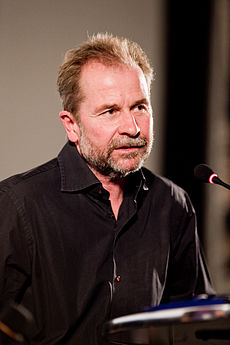fiction.wikisort.org - Director
Ulrich Maria Seidl (born 24 November 1952 in Vienna)[1] is an Austrian film director, writer and producer. Among other awards, his film Dog Days won the Grand Jury Prize at Venice in 2001.
Ulrich Seidl | |
|---|---|
 | |
| Born | 24 November 1952 Vienna, Austria |
| Occupation | Film director |
| Years active | 1980–present |
| Website | http://www.ulrichseidl.at |
His 2012 film Paradise: Love competed for the Palme d'Or at the 2012 Cannes Film Festival.[2][3] The sequel Paradise: Faith won the Special Jury Prize at the 69th Venice International Film Festival.[4] The final part of the trilogy, Paradise: Hope, premiered in competition at the 63rd Berlin International Film Festival.[5][6]
Biography
Seidl grew up in a Roman Catholic family. Although at one point he wanted to become a priest, he studied journalism and drama at Vienna University instead.[1] Afterwards, he studied film-making at the Vienna Film Academy where he produced his first short, One-Forty. Two years later he produced his first full-length film, The Ball. His 2001 film Dog Days was shot over three years during the hottest days of summer.[7]
He is married to Veronika Franz, an Austrian filmmaker well known for her psychological horror features Goodnight Mommy (2014) and The Lodge (2019), which she both co-directed and co-wrote with their nephew Severin Fiala.
In 2005 Seidl was a member of the jury at the 27th Moscow International Film Festival.[8] He was scheduled to attend the 2014 Jerusalem Film Festival, but cancelled his visit due to the political tension in the region.[9]
Style
Ulrich does not consider himself a documentary filmmaker, but several of his films often blend fiction and nonfiction.[10] Several of his films are set in his home country, Austria.[1]
Filmography
- 1980 One Forty (Einsvierzig) (short)
- 1982 The Prom (Der Ball) (short)
- 1990 Good News
- 1992 Losses to Be Expected (Mit Verlust ist zu rechnen)
- 1994 The Last Men (Die letzten Männer) (TV)
- 1995 Animal Love (Tierische Liebe)
- 1996 Pictures at an Exhibition (Bilder einer Ausstellung) (TV)
- 1997 The Bosom Friend (Der Busenfreund) (TV)
- 1998 Fun without Limits (Spass ohne Grenzen) (TV)
- 1999 Models
- 2001 Dog Days (Hundstage)
- 2002 State of the Nation (Zur Lage)
- 2003 Jesus, You Know (Jesus, Du weisst)
- 2004 Our Father (Vater unser) (filmed stage play)
- 2006 Brothers, Let Us Be Merry (Brüder, laßt uns lustig sein) (short)
- 2007 Import/Export
- 2012 Paradise trilogy (Paradies)
- Paradise: Love (Paradies: Liebe)
- Paradise: Faith (Paradies: Glaube)
- Paradise: Hope (Paradies: Hoffnung)
- 2014 In the Basement (Im Keller)
- 2016 Safari
- 2022 Rimini
- 2022 Sparta
Awards
- IDF Amsterdam Special Jury Prize - 1993 Loss Is to Be Expected
- Sarajevo Audience Award - 1999 Models
- Gijón Grand Prix Asturias - 2001 Dog Days
- Venice Silver Lion - 2001 Dog Days
- Karlovy Vary Best Feature Documentary - 2003 Jesus, You Know
References
- Hans-Michael Bock and Tim Bergfelder. The Concise Cinegraph: An Encyclopedia of German Cinema. Berghahn Books. p. 440. ISBN 978-0-85745-565-9.
- "2012 Official Selection". Cannes. Retrieved 2012-04-19.
- "Cannes Film Festival 2012 line-up announced". timeout. Retrieved 2012-04-19.
- "Official Awards of the 69th Venice Film Festival". labiennale. Archived from the original on 2012-09-12. Retrieved 2012-09-09.
- "First Films for the Competition and Berlinale Special". berlinale. Retrieved 2013-01-02.
- Simon Mraz (Austrian Cultural Forum Moscow). Program Austrian Cultural Season in Russia 2013/14. AustrianCulturalForum Moscow. p. 310. GGKEY:XE8SU7JWWQU.
- Roger Ebert (1 November 2005). Roger Ebert's Movie Yearbook 2006. Andrews McMeel Publishing. pp. 173. ISBN 978-0-7407-5538-5.
- "27th Moscow International Film Festival (2005)". MIFF. Archived from the original on 2013-04-03. Retrieved 2013-04-09.
- Mitchell, Wendy. "Seidl and other filmmakers cancel Jerusalem trips". Screen Daily. Retrieved 29 July 2014.
- Robert von Dassanowsky; Oliver C. Speck (15 April 2011). New Austrian Film. Berghahn Books. p. 189. ISBN 978-0-85745-232-0.
External links
- Official website
- Ulrich Seidl at IMDb
На других языках
[de] Ulrich Seidl
Ulrich Seidl (* 24. November 1952 in Wien) ist ein österreichischer Filmregisseur, Drehbuchautor und Produzent.- [en] Ulrich Seidl
[es] Ulrich Seidl
Ulrich Maria Seidl (n. 24 de noviembre de 1952; Viena, Austria) es un guionista, productor y director de cine austriaco. Logró el Gran Premio del Jurado en 2001 en el Festival de Venecia por su película Hundstage (Días de canícula), una historía entre simpática, violenta, casi truculenta, y de un aire marcadamente surrealista.[ru] Зайдль, Ульрих
Ульрих Зайдль, нем. Ulrich Seidl (р. 24 ноября 1952, Вена) — австрийский кинорежиссёр, сценарист и продюсер.Другой контент может иметь иную лицензию. Перед использованием материалов сайта WikiSort.org внимательно изучите правила лицензирования конкретных элементов наполнения сайта.
WikiSort.org - проект по пересортировке и дополнению контента Википедии